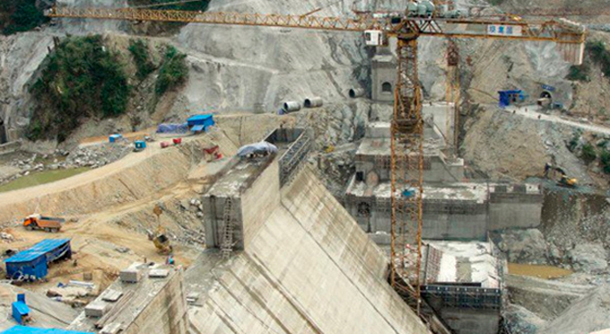RANGOON—Chinese investment in Burma has sharply declined since President Thein Sein’s reformist government took over from the military junta in 2011, says a US-based think tank. It warns that this fall in investment could hurt Burma’s economic development and the success of its nascent democratic reforms.
Burmese public opposition against China’s Myitsone Dam and the Letpadaung copper mine, and the government’s decision to suspend the projects, have seriously affected economic relations between the two countries, according to a report by Yun Sun, a researcher with the Stimson Center, a foreign policy research institute in Washington.
“[P]olitical reforms since 2011 have substantially impacted Chinese projects, causing the rapid decline in Chinese investment,” Sun wrote. “China perceives that Myanmar is now a more unfriendly and risky place to invest and is displeased that the Myanmar government is not doing more to protect Chinese interests.”
Chinese investment in Burma fell from about US$12 billion in 2008-2011 to just $407 million in 2012-2013. Non-Chinese investment failed to make up for the shortfall and overall foreign direct investment (FDI) plummeted from $20 billion in 2010-2011, to $4.6 billion in 2011-2012, and only $1.4 billion in the last fiscal year.
The report warned that this trend not only threatened Burma’s economic development, but also its democratic transition. It added that attracting foreign investment in infrastructure was pivotal to Burma’s development.
“The economic success of the new democratic system in Myanmar is critical to the sustainability of the nation’s political transition,” Sun wrote. “[T]here is a need for both Chinese investors and Myanmar to recalibrate their positions to reduce distrust and hostility, and assume mutually beneficial cooperation.”
Chinese Embassy spokesman Gao Mingbo confirmed in a reaction that Chinese FDI had fallen sharply since 2011, adding “The [FDI] situation was bad last year, but it might improve a little bit this year.”
Gao Mingbo echoed some of the report’s findings, saying there was a strong need for both Burma and China to address the concerns surrounding Chinese investments, so that the suspended projects can resume.
“It’s important that the two sides step up their efforts,” he said. “Obviously, we are trying very hard… We have to increase the risk awareness among the [Chinese] operators. We also need more outreach efforts to local communities and the media” about investment projects.
During the past two decades, Burma’s former military regime relied heavily on China for political and economic support.
Around 2008, Beijing began to step up large-scale investment in Burma and it reached agreements with the generals in Naypyidaw for the implementation of three mega projects—the $3.6-billion Myitsone hydropower dam, the $1-billion Letpadaung copper mine and the $2.5-billion Shwe oil and gas pipeline.
Sun said China had “consciously pushed to ink these deals before the 2010 elections to maximize its holding of Myanmar natural resources.” Most of these investment funds, she added, had since been disbursed in Burma by the Chinese state-owned companies involved.
However, after Thein Sein’s nominally-civilian government took office in 2011, it suspended the Myitsone Dam until 2015. The Letpadaung mine was suspended in November 2012.
Both decisions were taken following a popular backlash among the Burmese public against the projects, which were perceived as having heavy social and environmental impacts on local communities, while mostly benefiting China and Burma Army-affiliated companies.
The oil and gas pipeline, which runs from western Burma’s Arakan coast to Kunming, the capital of southern China’s Yunnan Province, has encountered fewer problems, according to Sun, because it is a joint enterprise involving six firms from four countries, China, Burma, India and South Korea.
In recent months, Burma’s Parliament launched an investigation into the Letpadaung mine, which concluded that it should resume if Burma’s government gains greater benefits from the project and if concerns about its local impact are addressed.
Since then, a new project agreement has been reached that provides far greater income benefits to the Burmese government, while the Chinese project investor and Burmese Army-affiliated Union of Myanmar Economic Holdings took a large cut in project incomes.
The Stimson Center report said this new agreement was potentially a significant development as “it creates the legal, political and bilateral precedent for renegotiation on profit-sharing and for how Chinese investors should address the inadequacies of their projects” in Burma.

















